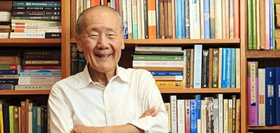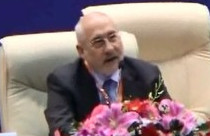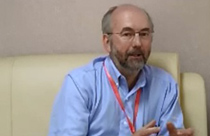Stories reflecting spirit of Chinese scientists
Author : HAN QIDE Source : Chinese Social Sciences Today 2019-10-28

Stories of Chinese Scientists
Since reform and opening up, China has made great achievements in the fields of science and technology. However, China is still relatively weak in the basic fields of scientific research and is lacking in major original findings. The fact that key technologies are still controlled by other countries has not changed. Today’s China needs to build its science disciplines and push forward with its scientific spirit more than ever before.
Stories of Chinese Scientists tells the stories of eight Chinese scientists, including Chu Ko-chen (1890–1974), Qian Xuesen (1911–2009), He Zehui (1914–2011), Wu Zhengyi (1916–2013), Liu Dongsheng (1917–2008), Liang Sili (1924–2016), Yuan Longping (1930– ) and Tu Youyou (1930– ). These stories contain profound educational value and practical significance. All these eight scientists have made important contributions to national welfare and people’s livelihoods. Co-written by the academic team of the Project of Collecting Historic Data of Scientists’ Academic Life, the series consists of eight picture books typical of Chinese painting techniques.
The patriotism of protecting the motherland and serving the people is fully displayed by these Chinese scientists. He Zehui studied ballistics to resist foreign aggressors; Qian Xuesen gave up a privileged life in the United States and returned to China to build up the national defense; Yuan Longping studied hybrid rice in fields for sufficient food provision.
The innovative spirit of Chinese scientists is reflected in He Zehui’s discovery of uranium trinary and quaternary fission under the microscope. Liu Dongsheng made significant breakthroughs in theories relevant to the loess formation mechanism. Liang Sili dedicated himself to developing the Dongfeng missiles and the Long March rocket.
The spirit of practicality inherent in Chinese scientists means searches to seek truth with rigorous scholarship. Chu Ko-chen observed climate change and recorded it in diaries for years; Tu Youyou successfully extracted artemisinin to cure malaria after many failures in her laboratory; it took Wu Zhengyi ten years to sort data of 30,000 plant species.
Chinese scientists are also indifferent to fame and wealth. The 92-year-old He Zehui still carries her backpack to go to work every day; the 89-year-old Yuan Longping still conducts studies in the rice fields; Tu Youyou has continued her study of artemisinin after receiving the Nobel Prize in medicine.
Stories of Chinese Scientists also displays the spirit of cooperation. The new antimalarial drug artemisinin was discovered after more than 60 institutions engaged in 523 research projects over 13 years; numerous scientific workers jointly developed China’s own atomic and hydrogen bombs and man-made satellite; more than 300 authors and 160 painters spent 45 years on compiling Flora of China.
(Edited by YANG LANLAN)
Interview with Wang Gungwu on significance of studying overseas Chinese
Wang Gungwu is a distinguished Australian historian who studies overseas Chinese. He currently works at the Faculty o...
-
On the rat/mouse of the zodiac
2020-02-20
-
Regional development calls for Huaihe culture’s soft power
2020-01-10
-
Archaeological discoveries unveil Maritime Silk Road
2020-01-06
-
China’s industrial art printing
2019-12-10
-
Yue-Gan Ancient Road: A journey into Hakka history
2019-05-13
-
The Lantern Festival in Dream of the Red Chamber
2019-02-18














 2011-2013 by www.cssn.cn. All Rights Reserved
2011-2013 by www.cssn.cn. All Rights Reserved